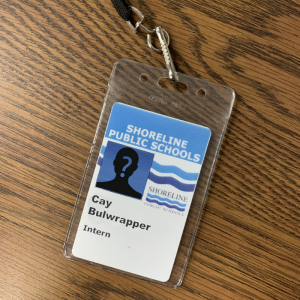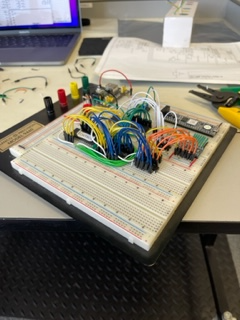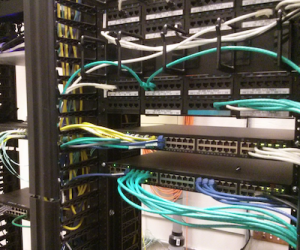Internship Introduction

This program can provide an opportunity to serve the staff and students of the Shoreline School District while still being a student yourself. Over the next one, two, or three years (depending on your age), you will engage in a learning environment that encompasses elements of computer science, information technology, computer engineering and other technical disciplines. Additionally, you will be able to perform work "in the field" in order to help maintain District technologies and systems and gain practical experience.
On this page, you will find general information on what you can expect from being an intern and see an overview of what is expected of you as an intern. The IT department accepts a limited number of students per enrollment period and you must be sure that this is right for you. The time and mental demands can be very challenging so be sure to fully understand what you may be getting into.
What do Information Technology interns do?
Learning Experience

Taking AP Computer Science Principles and AP Computer Science A in high school will teach you many things about computers and programming. These classes will give you a high level understanding of what computers are used for and how to get them to do what you want them to do. But HOW computers work is another story. You will often hear that computers work in the binary number system and that transistors are the most important device that allow computers to work. Your learning experience in the internship will take you to the lower levels that are typically glossed over in most classes.
For new interns, there is a multi-month learning curriculum to bring new students up to speed. The material gets VERY DEEP into how computers work. We get into computer mathematics, logic design, electronic circuits, computer architecture, low-level programming (Assembly), and high-level programming (Java, Perl). This can be quite intimidating as the topics explored are typically considered college level material. This learning experience makes sure students have a deep foundational understanding of how computers work and cements their skills in abstract thinking, causality and effective communication.
Once new interns have completed the initial learning phase, they become full interns and have many more learning options and activities available. Interns are always engaged in learning activities and projects and they can decide what pathways to follow according to their interests. Where possible, interns will be assigned tasks/duties that coincide with their chosen learning pathways to enhance the learning experience.
Hands-On Labs
All interns use their acquired knowledge in practical lab projects. Early projects are guided learning experiences working through pre-made kits. Interns have access to electronic components, workstations, oscilloscopes, signal generators and other tools to create working projects. Later projects can be custom projects or enhancements of recreations of projects done by previous groups of interns.
IT Department Support

The Information Technology department of the Shoreline School District services over 1500 and 8500 students across 20 sites in the cities of Shoreline and Lake Forest Park. Interns will often engage in helping technicians to troubleshoot, install, maintain, decommission and inventory equipment and software. These tasks will usually be done during non-school days (school breaks and the Summer). Interns must have a flexible schedule to work on those days.
The most common work involves physical labor, repetitive and small tasks. While these tasks may not sound exciting, they are critically important and have a significant impact on school functions. Interns must be willing to take on these kinds of duties. Interns will gradually learn more and build their skillset allowing them to take on more complex and interesting technical tasks. Students will gain experience with networking systems, servers, and programming. This experience will enhance the internship learning pathway that they are involved in. There are often large-scale technology/programming projects that students can participate in. Examples include:
- Implementing network infrastructure installation and configuration in school buildings
- Programming websites for district-wide functions
- Building applications to support monitoring and troubleshooting tasks.
- Operation system development
Note: It is important to understand that time spent in the internship program is entirely voluntary. Students have used aspects of the internship experience to gain community service credit for high school, college credit for internships or independent studies, and bullet items for resumes. Prospective students should be fully aware that there is no inherent provisions made for monetary compensation.
Is this right for you?
To determine if an internship is right for you, consider the following questions...
Have you ever written a computer program in your spare time? (you know... just for fun)
This experience will challenge your programming skills. All interns start off by running through a learning program in computer engineering to understand how computers work. This program is very technical and can take 6 months to a full year to complete.
Do you enjoy learning about computers?
The purpose of this internship is to learn as much as possible about computing. After the initial learning, interns will be eligible to engage in more advanced computer tasks. An internship with a school system is geared towards learning so you must continue to engage in activities that enhance your knowledge.
Keep in mind, computing is about machines that do mathematics. Prospective interns should be comfortable with learning and doing both arithmetical and logical mathematics.
Are you willing to work?
The IT department of the Shoreline School District as well as other departments frequently have computer related tasks that come up that we assign to interns. Some tasks are mundane and some are technically challenging. These are practical work experiences that you can put on a job resume or college application to demonstrate your technical acumen.
Do you have the ability to invest the time?
Interning can be very time consuming and students MUST be willing to commit as attendance is mandatory.
Time Commitment
All interns are expected to attend a minimum of 20 hours per month. This time will be spent on structured and independent learning projects. That time will be scheduled with the program coordinator. Students can sign up for extra time to get help with work on personal projects and to work on district projects to get hands-on practical experience. Students will also need to be able to do learning activities on their own time. These activities include reading assignments, videos to watch and research done independently.
General Schedule Information
To enter into the program, new interns will spend approximately 20 hours per month in deep learning about computers. These sessions will occur in the afternoon of early release days, one Saturday a month and one day during each of the school breaks. This is generally completed over the course of 6 months. For older students, there is flexibility as far as the specific days that are scheduled.